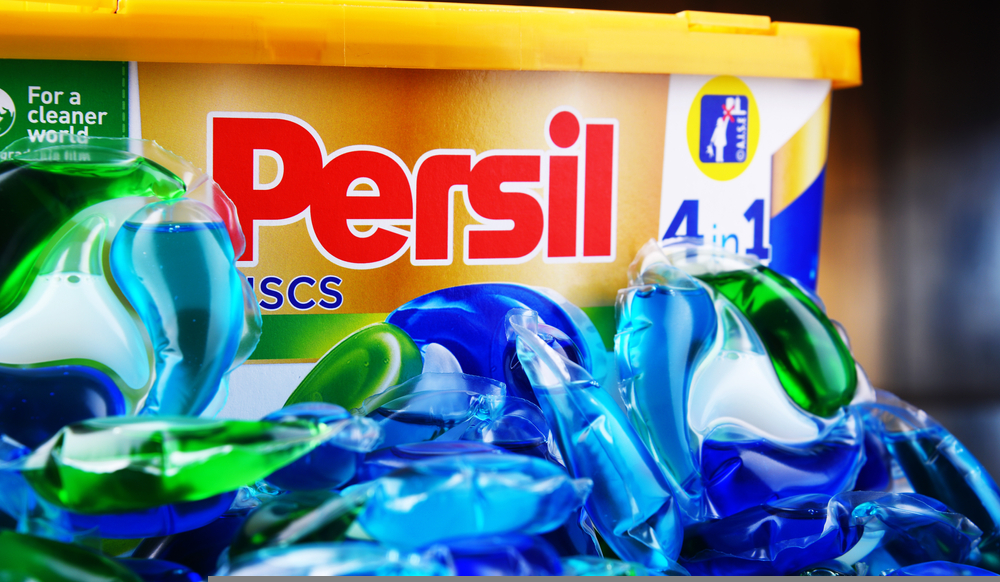A TV ad for Persil washing liquid has been banned by the Advertising Standards Authority (ASA) for making unsubstantiated environmental claims.
The ad depicts a boy viewing an image of a beach littered in plastic on TV. A woman then writes ‘#plantmoretrees’ on a social media app on her phone.
A voiceover states: “At Persil, we know that change doesn’t just happen in the comments section”.
Children are then seen to be collecting plastic litter from rivers and beaches, followed by a shot of muddy hands and a boy in a boat wiping his hands on his t-shirt.
The voiceover continues: “For real change, we all need to roll up our sleeves and get dirty.”
“That’s why Persil deeply penetrates the fibres of clothes to remove tough stains the first time, even in a quick or cold wash and our bottles are made with recycled plastic.”
Claims are then made that Persil products remove stains at 30 degrees Celsius and in 60 minute washes, and that the bottles are made with 50% recycled plastic.
The ad finished with on-screen text stating, “tough on stains, kinder to our planet.”
Complainants challenged whether the claims were ‘misleading’ and if they could be substantiated.
READ MORE: Tesco greenwashing ad banned for ‘misleading’ consumers
Unilever UK, owners of Persil, responded to the complaints by highlighting that the ad focused on how the brand ‘continually improve their products to be kinder to the planet.’
The multinational corporation claimed that it is well documented that reducing the temperature of a wash reduces carbon emissions and that this ad helps promote this.
With regards to the 50% less plastic promotion, Unilever stated that using recycled plastic ensures that bottles are kept in a ‘circular plastic economy’ and out of landfill.
Clearcast also believed the basis for all the environmental claims made were fully justified.
Nevertheless, the advertising watchdog asserted that environmental claims made in ads must be clear and accurately substantiated.
The ASA found the ‘kinder to our planet’ statement to be comparative and concluded that ‘kinder’ was likely to be ambiguous to viewers.
“The ad did not state or explain the basis of the comparative claim, such as whether the advertised liquid detergents were “kinder” in comparison to Persil’s own previous products or other products,” the ASA said.
“We concluded that the basis of the claim “kinder to our planet” had not been made clear. Additionally, in the absence of evidence demonstrating that the full life cycle of the product had a lesser environmental impact compared to a previous formulation, we concluded the ad was likely to mislead.”
The ASA ordered the ad to be taken down and asked Unilever to ensure that the basis of environmental claims are made clear in future ads, and that such claims are based on the ‘full lifecycle’ of the products, unless stated otherwise.
Andrew Terry, a Harbottle & Lewis law firm partner, had this to say about the banned ad:
“It is clear from the ad that Persil have been undertaking steps to reduce the environmental impact of some of their products – such as making their detergent effective in colder or quicker washes, and decreasing the amount of plastic in their packaging. Given those positive steps, why did the ad fall foul of ASA guidelines?
“Persil’s main claim was that their product was “kinder to the planet”. To support that claim, Persil needed to be specific about what that meant, including whether that claim was in comparison its own products, or its competitors – here, despite the environmental benefits, Persil did not make clear the ways in which their product was kinder than other products.
“Persil also failed to provide evidence about the environmental impact of the product based on its full life cycle, and how that compared with previous formulations. Although not always straightforward to quantify, assessing the full life cycle of a product is a cornerstone of the ASA’s approach to environmental claims.
“This decision continues the ASA’s robust approach to environmental claims – it remains focussed on any perception of “greenwashing” in advertising, and applies a strict approach to its analysis. This means that brands need to be extremely careful about deploying generalised green terms in advertising, and instead have an absolutely laser like focus on the specific product, and its full life cycle.”
Click here to sign up to Marketing Beat’s free daily email newsletter














